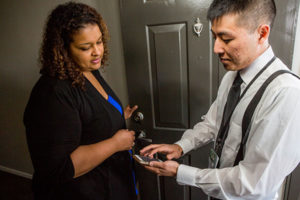An accurate and complete count of all people in the United States is enshrined in our constitution for good reason. The data gathered supports all communities, which means we all have a stake in the 2020 Census.
The census began as a way to establish a representative government, and it has strived toward that goal since its beginning in 1790. Even so, with a century of practice and advancement, certain communities are still consistently undercounted. This matters because an accurate census count has deep and far-reaching impacts on American communities.
How the 2020 Census Supports Communities
Beyond drawing the lines of congressional and state legislative districts, the results also apportion an estimated $1.5 trillion in federal spending. In fact, Washington State estimates that each household missed by the census amounts to $4,800 in lost federal funds every year. These losses diminish vital community services like nutrition programs and affordable housing.
The Community Foundation and our nonprofit partners understand what is at stake, because the nonprofit sector routinely delivers these services through federal grants and works to fill any remaining gaps. In addition, we rely on census data to track community and demographic trends. These insights inform where and how we direct our limited resources. Simply put, an accurate count is necessary for a strong and effective nonprofit sector.
Private sector companies also base decisions on census data. Census results make the case for local infrastructure projects, such as hospitals, schools and roads. These building blocks of community health then attract companies and talented workers looking to relocate. Thus, a more complete count also provides a huge return on investment for our region’s broader economy.
Accuracy Concerns Around the 2020 Census
You’ve likely heard some news surrounding the 2020 Census and concerns about accuracy. Yet, most are unaware of how budget cuts to the Census Bureau are shaping preparations for this year’s count. Reduced funding has actually  forced census officials to scale back testing and outreach over the last two years. Missing these crucial steps increases the potential for error when counting marginalized groups such as Native people, immigrants, homeless folks, low-income households and even young children.
forced census officials to scale back testing and outreach over the last two years. Missing these crucial steps increases the potential for error when counting marginalized groups such as Native people, immigrants, homeless folks, low-income households and even young children.
The fact that the 2020 Census is the first to incorporate an online format only adds to the risks. As a result, undercounting could now affect millions of people who are standing on the downside of the digital divide. This includes seniors, rural communities and low-income households.
For these reasons, funders across the nation are stepping up to ensure a complete and accurate count of all communities. Locally, the Washington Census Equity Fund is pooling investments from 25 funders across the state. The Community Foundation for Southwest Washington is a proud partner in this effort.
To date, this collaborative has infused $1.5 million into 83 community-based organizations. More than $200,000 of which was awarded to organizations working here in southwest Washington. All of these grants are connecting undercounted communities to the census through outreach, education and resources.
Over the next few months, we will shine a light on six local organizations that are mobilizing in these ways. We hope their efforts show how we can all contribute to a more complete count that provides our region with the support and representation it deserves.
We hope you’ll join the Community Foundation in supporting a more fair and accurate count in our region. Together, we can seize this once-in-a-decade opportunity to create a more vibrant and prosperous region.
Because getting it right is important for everyone and every community.
More Information About Historically Undercounted Communities:
- Census Counts 2020’s hub of fact sheets about specific populations
- CUNY Center for Urban Research’s interactive map of undercounted groups by census tract, state, county, congressional district and legislative district
- The Washington State Office of Financial Management provides county-level maps with response score rankings for Clark, Cowlitz and Skamania Counties
- Philanthropy Northwest shares more about What’s at Stake for Census 2020
